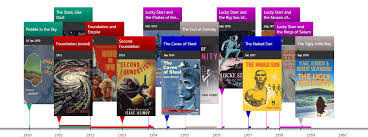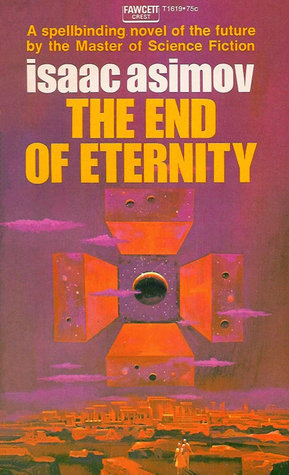The End of Eternity (1955) by Isaac Asimov
GoodReads meta-data is 192 pages rated 4.24 by 52,005 literatizens
Genre: Sy Fy
Verdict: Asimov!
Tag Line: The same old story.
Inspired by the Czech film based on the book, I read the book.

Harlan is an aspirant Platonic philosopher-king of sorts, working at the AllWhen Council that manages Reality in the imagine of divine being. The Council works through Life-Plotters, Sociologists, Technicians, Regulators, Observers, and a whole host of other specialists who tweak Reality for the best, long-term interests of humanity – the greatest good for the greatest number* is the mantra repeated and repeated – over the 7000 millennia of its existence. These tweakers are the Eternals with no life but service.
An example of a Minimum Necessary Change is to move a jar on a shelf, so that when in Reality a scientist reaches for it, it is missed. That faction of a second delay as the scientist gropes for the jar leads to a different result in the scientist’s experiment…with beneficial results, according to those specialists. Butterfly wings are another story.
Technicians travel time to move jars like that, but no one has ever been able to travel further than the 7000th millennium. That must be the end of human time, or is it?
Our hero is Harlan, a vain young man brimming with ambition who rises from Cub, to Maintenance, to Observer, to Technician very quickly. He is then selected for a special mission that embeds him (literally) in the 45th millennium. In the course of preparing for that mission he enters a garden of Eden where he finds Eve, a Timer (i.e., a mortal who lives in Reality, unlike the Eternals, who live pretty much forever). She wants him to make her Eternal; he wants to make her. The twain meet in the usual way.
None of the Eternals are women because abstracting a woman from Reality creates far more consequences than removing a man. Harlan has never seen a woman before and when he does he wants to eat the apple right there, right now. (By the way, Plato included women among the Philosopher Monarchs for what it is worth. This assertion about Plato is denied by some. Pity the fools!)

Asimov puts it this way: Eternals are recruited young from Reality after a lengthy analysis to determine the consequences of taking them out of Time. Many promising prospects are rejected because of the projected consequences. ‘[W]omen almost never qualified for Eternity because – for some reason he [Harlan] did not understand – their abstraction from Time was from ten to a hundred times more likely to distort Reality than was the abstraction of a man’ (p 55). Harlan goes on to speculate that it is because of reproduction, but that is guesswork. He often admits he doesn’t know. That does not quite fit with his arrogance, but it papers over gaps.
Harlan hatches a foolproof plan to have his Eve and live happily ever after, only to discover he is not dealing with fools who can be fool-proofed. In fact, he is the fool himself for Harlan discovers to his surprise all is not what it seems to be. Savour that irony. This Time Lord missed the obvious. Stubbornly he presses on.

Another thing he did not know was that Eve had a plan of her own. There are twists and turns in the plot and eternity gives way to…infinity. Neat. Very.
The plot is the thing. Asimov at the peak of his imaginative powers.
*Pedants note: ‘The greatest good for the greatest number’ is a phrase frequently attributed to John S Mill. Type it into Dr Google and see. Ahem, well, read every word he ever published and it cannot be found because he never wrote it. Another example of fake news. Nor does it fit his approach. The statement traces to be tiresome know it all Jeremy Bentham, not Mill.

